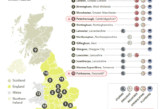A national procurement expert is urging landlords to utilise its innovative framework of specialist damp experts to ensure their properties don’t breach increasingly stringent regulations.
The rallying call from Merseyside-based Fusion21 — specialists in public sector procurement and social value services — comes in the wake of the landmark Social Housing Regulation Act which requires all landlords to act quickly when repairs are raised.
Damp and mould have been one of the main asset management talking points in the housing sector, with case after case being reported, and the new legislation will bring a whole new spotlight on those providers. Falling behind with repairs can result in sometimes devastating consequences, putting pressure on providers to find effective and reputable solutions quickly.
 Peter Francis, Executive Director of Operations at Fusion21 said: “Not getting this right can lead to the serious consequences of failing to provide homes fit for habitation, including the potentially dangerous impacts damp and mould can have on residents.
Peter Francis, Executive Director of Operations at Fusion21 said: “Not getting this right can lead to the serious consequences of failing to provide homes fit for habitation, including the potentially dangerous impacts damp and mould can have on residents.
“So, it’s understandable that this is a major issue, especially as we are now in the colder, damper months when problems are more likely to arise.”
The procurement experts are being urged to enlist the support of Fusion21’s frameworks which are targeted and updated to meet the evolving standards expected of landlords as well as responding to the priorities of its members, which is why they have launched a new Building Improvements Framework, worth up to £346m over four years.
There are nine lots within the Building Improvements Framework, with a specific lot for damp and mould.
Crucially this lot doesn’t assume that this issue is just to do with condensation issues, as damp can be caused by a range of factors, like insulation, lack of ventilation, rising damp, leaky plumbing and much more.
Peter added: “At Fusion21, we know that this is on the minds of our members because they’ve been asking us about it, with a marked increase in specific enquiries about damp and mould in the last year. This is only going to become more significant as UK legislation races to keep up with the focus on damp and mould.”
The framework targets the supply chain and specialist damp contractors who have the expertise that organisations are desperate for as they try to make sure they are quickly and effectively dealing with this issue.
Of course, while damp and mould may be the headline challenge for the sector, the Building Improvements Framework is set up to help tackle both the day-to-day issues as well as issues with major components like roofs, windows, doors, kitchens and bathrooms, hard and soft landscaping and aids and adaptations.
With the Decent Homes Standard under review, the expectations placed upon landlords may yet shift again in the near future, making it all the more important that repairs are conducted properly and in a timely manner.
The new framework has been designed in line with the proposed updates to the Decent Homes Standard as well as based on member and supply chain feedback and will launch in January 2024.
Damp and mould will be among the issues Fusion21 will debate at Homes UK, 22nd-23rd November at ExCel, London. This includes a panel talk ‘How to proactively detect and prevent damp and mould’ on 23rd November between 11am to 11.40am, which will explore the strategies that housing associations can use to get ahead of damp and mould and how to cope with increased demand on repairs services.
Celebrating its 21st anniversary this year, Fusion21 is a national social enterprise specialising in efficient and impactful public sector procurement and social value services. The procurement with purpose provider was created originally by and for the housing sector in 2002 but has since diversified into other sectors including local authority, education, NHS, and blue light.
To date, the organisation has saved its members more than £343m through the procurement process, created over 11,150 employment outcomes, and generated more than £165m in social impact.










